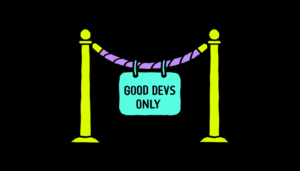“Just hire someone on Fiverr”—the default suggestion whenever tech leaders mention development bottlenecks. And why not? The platform brilliantly connected businesses to global talent pools, transforming how companies staff technical projects.
But here’s what experienced tech leaders understand: different development challenges thrive on different hiring approaches. Today’s specialized developer marketplaces offer nuanced alternatives worth exploring.
After spending years testing platforms for hiring developers (and burning through more budget than I’d like to admit), I’ve discovered that the right platform choice hinges on your specific project requirements, timeline flexibility, and quality expectations.
Fiverr shines for quick, clear-cut tasks. Other platforms do better with ongoing or complex projects. Your specific needs—building a full app, adding features, or fixing bugs—determine where you’ll find the right developer. Smart tech leaders know this: learning your options leads directly to better hires and better results.
In this analysis, I’ll break down the top alternatives to Fiverr for hiring developers in 2025, with specific insights on:
- Which platforms deliver the best developer quality for different project types
- How vetting processes actually work (beyond the marketing claims)
- Real pricing structures including hidden fees and minimum commitments
- Where to find developers with startup and scaleup experience
- How to match your specific project needs to the right platform
The goal isn’t to declare one platform “best”—it’s to help you identify which option aligns with your specific technical requirements, timeline constraints, and budget realities.
Why Look Beyond Fiverr for Developer Talent?
Fiverr works well for small, clearly defined coding tasks. Need a quick WordPress fix or a simple script? It can deliver. But many tech projects need more, and that’s where limitations appear:
No serious vetting process: Anyone with an email address can create a developer profile on Fiverr. No technical assessment. No skills verification. You must screen candidates yourself, adding hours to your hiring process.
Package-based structure limits flexibility: Fiverr sellers offer fixed packages with set deliverables. This creates problems when your project needs change or evolve—a daily reality in software development.
Communication gaps: Many Fiverr developers excel at executing specific instructions but struggle with the back-and-forth needed for complex projects. Time zone differences and language barriers can compound these challenges.
Scope and complexity constraints: Larger projects involving multiple systems or requiring deep technical discussions often exceed what Fiverr’s transaction model supports. More complex work typically demands more collaborative approaches.
These limitations explain why many tech leaders keep Fiverr in their toolkit for certain tasks but turn to other platforms when building more substantial or complex products.
Top Fiverr Alternatives for Hiring Developers in 2025
Lemon.io: Vetted Developers for Startups and Scale-ups

Need vetted developers without the endless interviews? At Lemon.io, we connect startups and scale-ups with pre-screened talent from Europe and Latin America. We handle the vetting, you get back to building.
Key strengths:
- Seriously selective: We reject 98.8% of applicants. Only the top 1.2% make it through our four-stage vetting.
- Quick high-quality matches: Most clients get matched with qualified developers within a week or two, not months.
- Battle-tested talent: Our 1,500+ developers average 7+ years of commercial experience. No rookies here.
- No long-term traps: Month-to-month flexibility because your needs change. No awkward breakup conversations.
- Tech stack coverage: From React and Node.js to Python, Ruby, mobile dev, and dozens more technologies.
We don’t just find coders—we find collaborators who get product development. They communicate clearly and pivot quickly when your requirements change. No more freelance headaches like miscommunication and missed deadlines.
Our four-step vetting isn’t just about technical chops. We check resumes, assess soft skills, conduct technical interviews, and verify past work. The result? Developers who can code and collaborate (a surprisingly rare combination).
Rates run $50-120/hour depending on experience—quality without the premium markup of high-end platforms. And yes, we offer a risk-free trial period. If you’re not happy, we’ll find someone else. Simple as that.
To see how our approach works in practice, read our Lemon.io review.
Upwork: Wide Selection with Higher Management Requirements
Upwork remains the largest freelance marketplace, offering access to thousands of developers across every imaginable technology stack.
Key strengths:
- Massive talent pool: Millions of freelancers across virtually every technology
- Complete control: Direct access to browse and filter candidates without platform interference
- Flexible pricing: Rates from $15 to $150+/hour accommodate various budgets
- Integrated tools: Time tracking, milestone payments, and contract management in one place
The platform works best for technical leaders who have experience evaluating developers and can dedicate time to the screening process. Its size offers unmatched selection but requires significant filtering effort.
Upwork’s fee structure? It’s changing. Right now, freelancers pay a flat 10% on all earnings. But come May 2025, they’re rolling out variable fees (0%-15%) based on work category demand and subscription type. What this means for you: potential shifts in both talent availability and pricing as developers adjust to these changing economics. Worth keeping an eye on.
For a more detailed breakdown, see our Upwork review.
Toptal: Premium Talent for High-Stakes Projects
Toptal pioneered the “elite developer” model with its claim of accepting only the “top 3%” of talent.
Key strengths:
- Rigorous vetting: Multi-stage technical and communication assessment
- Enterprise-grade talent: Developers with experience at major tech companies
- Comprehensive matching: Personalized talent matching with dedicated account representatives
- Risk reduction: Offers no-risk trial periods with qualified developers
The platform excels at serving enterprise clients with sophisticated technical needs and the budgets to match. Their extensive documentation and structured processes align well with larger organizations’ requirements.
Pricing starts at $60—$80 per hour and quickly scales to $120—$200+ per hour for specialized expertise. This premium positioning puts them out of reach for many startups and mid-sized businesses with budget constraints.
Check our article “Toptal Alternatives [2025]: Better Options for Hiring Elite Developers“.
Arc.dev: AI-Powered Matching with Remote Focus
Arc.dev (formerly CodementorX) wants to be the tech matchmaker of your dreams. Their pitch? AI-powered algorithms that find your developer soulmate faster than traditional platforms.
Key strengths:
- AI does the heavy lifting: Their algorithms match you with developers so you don’t have to wade through profiles yourself
- Remote work specialists: Built specifically for distributed teams and borderless hiring
- Enterprise-friendly paperwork: Partnerships with platforms like Deel handle the cross-border compliance headaches
- $300 to play: Want in? That’ll be a $300 refundable deposit to start. (Don’t worry, it applies to your first invoice)
Their vetting process covers the basics: profile checks, personality interviews, and coding assessments through pair programming. Nothing revolutionary, but effective enough to filter out the resume-padders.
Developer rates span from budget-friendly $15/hour all the way up to specialist-level $110/hour. But watch out for the platform fees, and the fact that they take a 20% placement fee (charged to the talent) if you want to convert a freelancer to full-time. Not exactly pocket change.
Freelancer.com: Budget-Friendly with Quality Variance
Think Upwork’s budget-conscious cousin who moved abroad. Freelancer.com follows the same bidding approach but with its own twist—and sometimes that twist is “you get what you pay for.”
Key strengths:
- Race to the bottom pricing: Their bidding wars often drive rates down. Great for your wallet, not always for quality.
- Project-based mindset: Perfect when you need something specific with clear endpoints, not ongoing collaboration.
- Contests for the commitment-phobic: Can’t decide on one developer? Host a contest and have multiple coders compete for your project.
- Global talent arbitrage: Access developers from regions where $15/hour is actually a great rate.
This platform shines when you know exactly what you need and can spot good work from bad. Got a sharp eye for quality code? You might score a bargain. Not so confident in your technical screening? Prepare for some adventures in debugging.
Fee-wise, they take 3% from you and 10% from the developer. This means the best talent often looks elsewhere for gigs—why lose 10% when other platforms offer better terms?
If you’re weighing this option, our Freelancer.com review offers additional perspective.
Gun.io: Technical Specialization with White-Glove Service
Gun.io is what happens when engineering nerds build a hiring platform. They’re obsessively focused on technical excellence and don’t apologize for it.
Key strengths:
- Hardcore technical vetting: Three-stage assessment that actually tests whether developers can code, not just talk about coding
- Complex problem solvers: Their sweet spot is “projects that make other developers cry”
- America-centric talent pool: Heavy on U.S. developers—great for timezone alignment, less great for your budget
- White-glove treatment: They’ll hold your hand through the entire process (metaphorically… this isn’t a dating service)
Gun.io thrives when you’re tackling the kind of technical challenges that make Stack Overflow threads go on for pages. Their developers aren’t building basic CRUD apps—they’re solving the problems that keep engineering leads up at night.
Expect to pay premium rates: $80-150/hour is standard. But unlike some platforms, you’re actually getting specialized expertise for that price, not just inflated rates with fancy packaging.
Developer Vetting: Who Actually Delivers Quality?
The vetting process separates the contenders from the pretenders. Here’s who’s actually checking if developers can code versus who’s just checking if they can fill out a form:
Platform |
Acceptance Rate |
Vetting Approach |
The Real Deal |
|---|---|---|---|
Fiverr |
Not disclosed |
ID verification (mandatory by Feb 2025), 70% passing threshold on skill tests for technical categories |
Better than reputation suggests, but still relies heavily on buyer reviews for quality control |
Lemon.io |
1.2% |
Four-stage gauntlet: resume screening, soft skills interviews, live technical assessments, final verification (1-2 weeks) |
Serious about saying “no.” No take-home tasks—we want to see you code under pressure |
Upwork |
High (most accepted) |
Basic identity verification, optional skill tests |
The velvet rope that isn’t. Almost anyone with a pulse can join, client reviews do the sorting after |
Toptal |
Claims “top 3%” |
Language checks, personality assessment, technical screening, live coding challenges |
Thorough process but somewhat corporate. |
Arc.dev |
Claims “top 2%” |
Three-step process: profile review, behavioral interviews, technical assessment |
Math is fun when everyone’s special. Claims exclusivity like Toptal |
Freelancer.com |
High (most accepted) |
Minimal upfront verification |
Upwork’s more relaxed cousin. Hope you enjoy screening candidates yourself! |
Gun.io |
~10% |
Algorithmic screening, background checks, live technical interviews |
Engineering nerds vetting other engineering nerds. Tests problem-solving over resume polish |
The real difference isn’t just who says “no” the most—it’s whether they’re testing for skills that actually matter to your project. Lemon.io and Gun.io test for practical development skills, while others might be checking boxes that look good on paper but don’t predict real-world performance.
Pricing Comparisons: Beyond the Hourly Rate
Let’s talk about the real cost of hiring developers — the hourly rate is just the appetizer. Here’s what you’re actually paying:
Platform |
What Developers Charge |
What Platforms Take |
Minimum Requirements |
The Gotchas |
|---|---|---|---|---|
Fiverr |
$15-100+/hr |
5.5% service fee from you + 20% from the developer |
None |
$2 fee on orders under $50, plus developers factor that 20% loss into their rates |
Lemon.io |
$50-120/hr |
Undisclosed margin |
No minimums |
Transparent pricing with no hidden fees |
Upwork |
$10-150+/hr |
You pay 3-5%, plus $0.99 to $14.99 USD per new contract, and 0-10% from developers |
None |
Currency conversion fees, payment processing costs, and variable client fees based on spending history |
Toptal |
$60-200+/hr |
30-50% markup (not transparent to clients) |
Often 10+ hours weekly |
$500 deposit required, $79 monthly platform fee — the subscription model nobody asked for |
Arc.dev |
$15-110/hr |
Not disclosed |
$300 deposit |
Hefty 20% placement fee if you want to hire full-time (that’s a fifth of annual salary) |
Freelancer.com |
$10-100+/hr |
3-5% from you + 10% from developers |
None |
Contest listing fees, “featured project” fees, and various upsells to promote your listing |
Gun.io |
$80-150+/hr |
Built into rates |
20+ hours weekly |
None disclosed, but pricing is definitely premium |
BUT… What you see is rarely what you pay. Toptal’s seemingly reasonable rates become much less competitive when you factor in their massive markup and subscription fees. Meanwhile, Fiverr and Upwork take slices from both sides of the transaction, which explains why quality developers often avoid these platforms—why lose 5-20% of your income when better options exist?
Platforms with more transparent pricing structures (like Lemon.io) might actually save you money despite higher advertised rates, simply by eliminating the hidden fee carnival.
Developer Quality and Specialization
Each platform has carved out its own specialty in the developer marketplace. Here’s what each one delivers:
Fiverr: The jack-of-all-trades for quick hits. Need a WordPress tweak, basic API integration, or simple frontend update? Fiverr delivers affordable options—just be prepared to wade through varying quality levels. Perfect for when your project specs fit on a sticky note.
Lemon.io: That’s us! We focus exclusively on serving startups and scale-ups with developers who understand the chaotic reality of building products. Our ~1% acceptance rate filters for people who can launch MVPs, accelerate feature development, and stabilize shaky infrastructure without handholding. We match companies with developers who speak both code and business.
Upwork: The everything store of development talent. Their massive pool covers literally every tech stack in existence. The catch? You’ll need technical skills to separate the pros from the pretenders. With patience and screening expertise, you can unearth gems at reasonable rates.
Toptal: The premium option for enterprise clients. Their “top 3%” marketing masks a simple truth: they focus on developers with impressive résumés and big-company experience. Expect polished professionals who can tackle sophisticated challenges—if you can stomach the premium pricing.
Arc.dev: The AI matchmaker for remote hiring. Their claim of accepting only the “top 2%” sounds like Toptal’s marketing, but they do filter for remote work capabilities and offer 72-hour matching for urgent needs. Good fit for distributed teams needing quick placement.
Freelancer.com: The budget-conscious option. Their bidding system drives competitive rates for clearly defined projects. Works best when you know exactly what you need and can write detailed requirements. The quality varies wildly, but the prices can’t be beat.
Gun.io: The technical specialist. Their triple-vetting process focuses on finding developers who can tackle the thorniest technical challenges. At $75-145/hour, they’re not cheap, but they excel with projects that make typical developers break out in a cold sweat.
Your optimal match depends on your specific needs, technical complexity, and how much hand-holding you require.
Which Fiverr Alternative Best Suits Your Needs?
The right platform depends on your specific situation:
For startups and scale-up companies: Lemon.io offers the best balance of quality, speed, and startup relevance. We focus on product experience and communication skills, addressing the unique challenges of early-stage development.
For enterprise and established products: Toptal remains competitive despite premium pricing. Their large global pool increases the chances of finding specialized enterprise skills.
For technical teams expanding capacity: For technical teams with screening capacity, Upwork offers the best value opportunity. The ability to directly evaluate candidates allows you to find quality at reasonable rates.
For non-technical founders: Non-technical founders benefit most from Lemon.io’s human-centered vetting and startup focus. Their developers can bridge the technical-business gap effectively.
For specific technical challenges: Gun.io’s technical focus works well for complex engineering challenges requiring specialized expertise.
The Final Verdict: Choosing Your Ideal Developer Marketplace
After evaluating multiple platforms, several clear patterns emerge:
- Project complexity drives platform choice. Simple, well-defined tasks can work on Fiverr or Freelancer.com. Complex products need platforms like Lemon.io with developers who understand the full development lifecycle.
- Your technical screening ability matters. If you can confidently evaluate developers, Upwork offers tremendous value. Without that skill, vetted platforms save countless hours and reduce risk.
- Budget constraints create tradeoffs. Premium platforms like Toptal deliver quality but at rates that strain startup budgets. Mid-market options like Lemon.io offer better quality-to-cost ratios for most projects.
- Communication needs vary by project type. If your project requires frequent collaboration and adaptability, prioritize platforms that screen for communication skills and startup experience (like Lemon.io).
For most innovative companies building new products or expanding technical capabilities, Lemon.io offers the most compelling alternative to Fiverr in 2025. Our combination of thorough vetting, startup-relevant experience, transparent pricing, and personalized matching addresses the primary pain points that drive companies to seek alternatives.
Companies with enterprise needs and larger budgets may find value in Toptal’s approach. Technical teams comfortable with screening their own candidates can extract excellent value from Upwork with sufficient time investment.
The most important step? Match your specific project requirements to the platform best designed to meet those needs—because in developer hiring, the right match matters more than the biggest marketplace.









